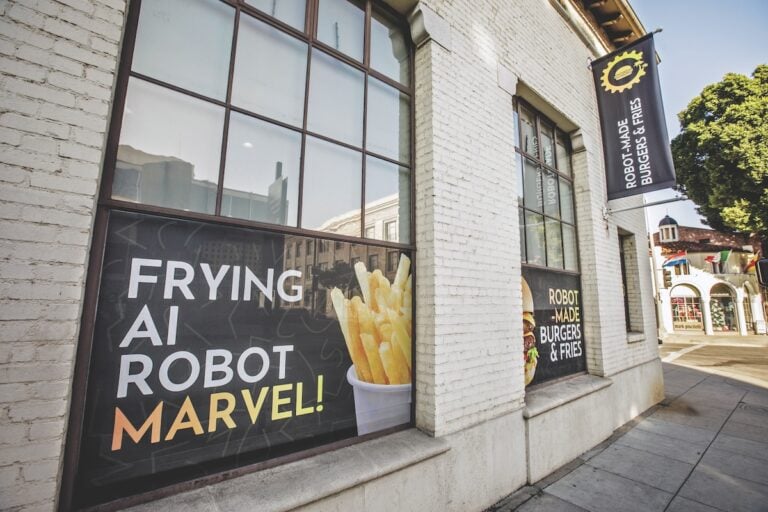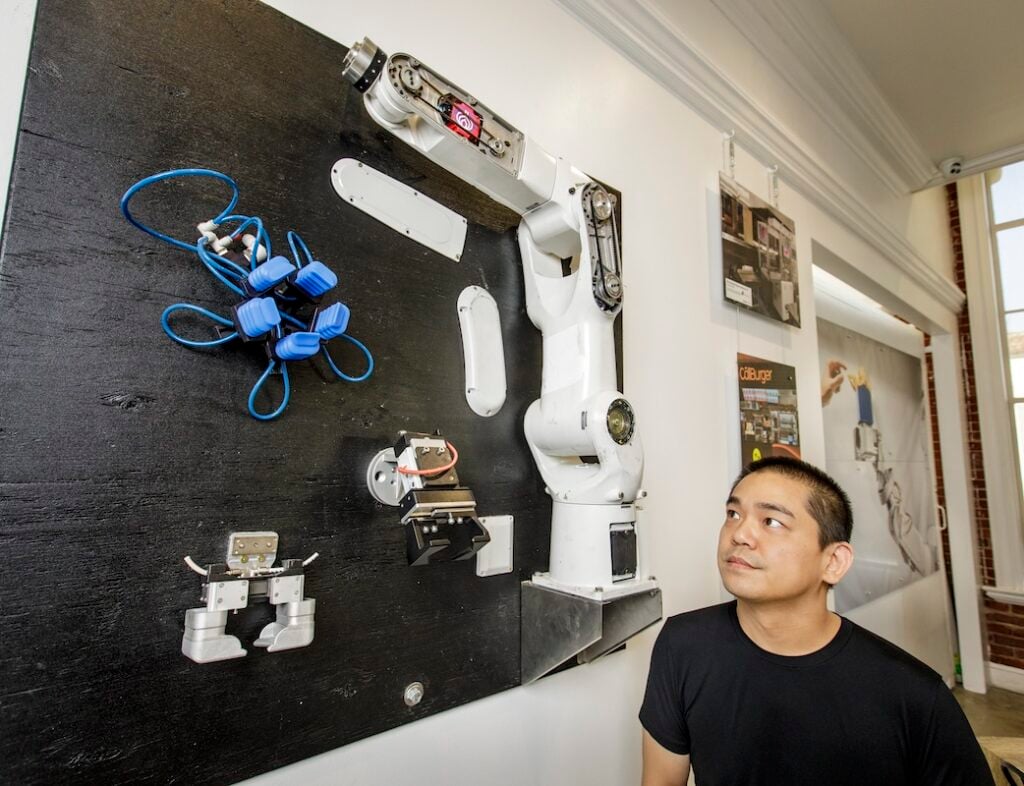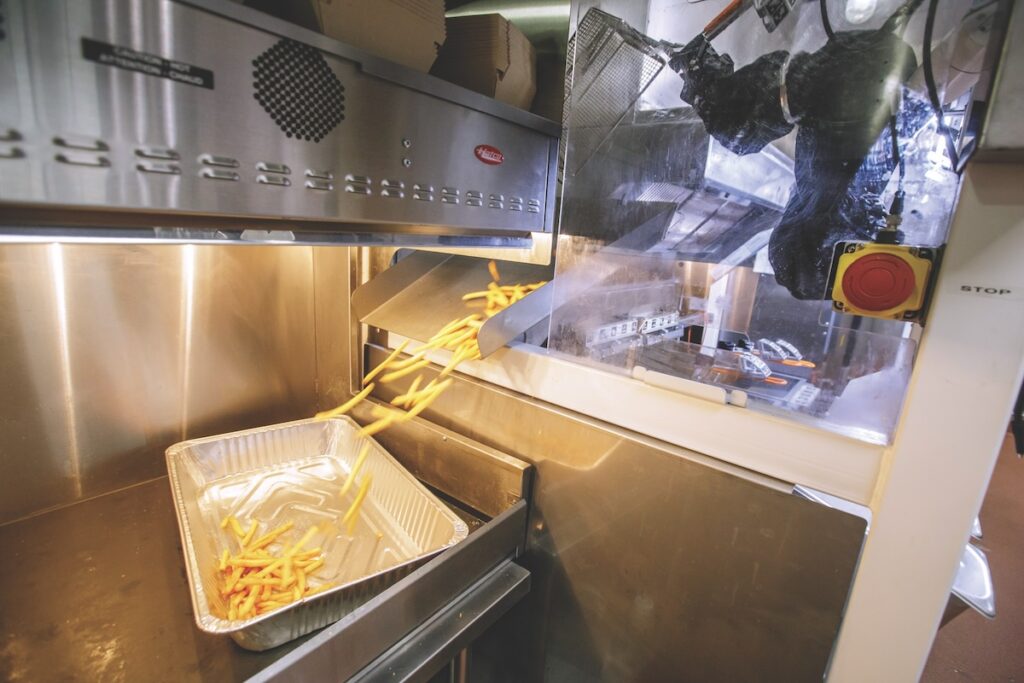
With ongoing staffing shortages in the food service industry and restaurant owners facing increases in minimum wages, restaurants are looking at technology to reduce labor costs and enhance productivity.
Miso Robotics, previously known for developing robotic equipment that is used by various restaurant chains, is now launching its own robotics-run restaurant. Set to open in Pasadena by the end of this month, the restaurant, called CaliExpress, will feature Miso’s artificial intelligence-enabled burger-flipping robot, initially developed as “Flippy.”
CaliExpress is a joint venture between Miso and holding company Cali Group, with a total investment exceeding $1 million. However, Cali Group, which already operates Flippy at its CaliBurger restaurant chain, will hold a substantial level of authority over the project, as it owns a minority stake in Miso. CaliExpress will occupy the property of a previous CaliGroup venture at 561 E. Green St. in Pasadena’s Playhouse District. Miso and Cali Group are based in Pasadena.
In addition to CaliBurger, Miso has partnered with companies including White Castle, Chipotle Mexican Grill Inc. and Panera Bread. Alana Abbitt, vice president of product development at Miso, said that the long-term goal for CaliExpress is not necessarily for Miso to become a new franchisee, but rather to provide a platform to showcase its technology in action for customers and investors.
“What our value proposition is, is for this to be a showroom for our prospective customers and current customers to see (Miso’s technology) in a live restaurant,” Abbitt said. “Seeing is believing, and while we have our lab literally down the street, it’s one thing when you are not doing it in a very fast-paced setting in front of customers and you’re just kind of tweaking and turning knobs and playing with it.”
Fast food
Flippy can quickly cook fried foods and is run by a robotic arm that hangs on a track above a restaurant’s frying station. After an order is rung into the system, an automatic dispenser fills a bin with the frozen food, which the arm then sets into the deep-frying machine and monitors cooking through a combination of cameras, sensors and AI algorithms. The other main piece of Miso-developed equipment, “BurgerBot,” sits in its own large machine, which looks similar to a pizza oven. The BurgerBot grinds meat to order, cooks the patty and deposits it into a container, where a human employee adds it to a bun with condiments and toppings.

Flippy can produce about 150 orders of fries per hour, while the BurgerBot can cook about 100 patties in that time. Flippy machines are available on a leasing model with either upfront or monthly payments, which Abbitt said provides flexibility for restaurant owners, though Miso is considering allowing customers to purchase the machines outright. The equipment can fit around existing fry machines, meaning no additional equipment purchases are necessary.
Miso has also used the underlying platform, data and technology that powers Flippy to expand its product line, including an automated drink dispenser called “Sippy” and a robotic coffeemaker called “Drippy.”

Rising wages
While complications from the Covid-19 pandemic remain for restaurant owners looking to hire staff, minimum wages for workers have continued to climb. Los Angeles County raised the minimum wage to $16.90 an hour in July, up from $15 in 2020 and about $10 in 2016. According to the U.S. Bureau of Labor Statistics, the average monthly wage for a food service employee in Los Angeles was about $2,631 in 2022. Leasing a Flippy machine costs between $1,500 and $3,000 a month, depending on the length of the customer’s contract. While these costs are similar, Miso’s technology means owners avoid spending money on health benefits or a training period and don’t have to worry about staff turnover or providing meal breaks.
Salar Sheik, principal and founder of Sawtelle-based Savory Hospitality Restaurant Consulting, said that restaurant owners contend not only with labor costs, but also with the expenses of training new employees.
“It’s not a secret that it’s really hard to staff anything these days, and it’s extremely difficult for the back of the house to entice someone to stand in front of a hot grill or fryer for eight hours a day,” Sheik said. “Robotics is going to fill a void that’s growing … front of house is a little different and personality goes a long way there for restaurant sales. Back of house is a place I don’t think we’re missing out on anything, to be honest with you. If anything, I think it’s going to add a layer of safety, a layer of competency, of timing and consistency.”
Abbitt said that she does not believe that employing technology like Flippy in a kitchen removes human jobs and said that it instead takes care of more dangerous or tedious tasks such as frying food, freeing up employees for more customer-facing tasks. Abbitt added that the introduction of technology to back-of-house operations can also create new technician roles; in addition to Flippy and BurgerBot, CaliExpress will employ one or two humans to watch over the machines, put burgers together and perform janitorial services.
“I don’t think it will displace workers,” Abbitt said. “I think there’s so much demand for help and support, and we’re nowhere near full automation.”
Along with Miso’s robots, CaliGroup is bringing in one of its subsidiaries to power operations: Pasadena-based PopID, a software developer of facial-recognition technology. PopID will run self-checkout kiosks at CaliExpress that will let customers quickly reorder previous purchases; the kiosks will also have optional facial-recognition technology. Anthony Lomelino, chief of staff at PopID as well as a former executive at both CaliGroup and Miso, said that PopID first operated its self-ordering kiosks at CaliBurger locations.
“We thought that we were geniuses, and then we found that average order times went from like 1 minute to 7 minutes,” Lomelino said. “We just weren’t getting the orders in fast enough, and then (PopID Chief Executive John Miller) and I had the idea that, what if the system can remember the person and offer them the same last few orders they made for fast repeat?”
Showcasing tech
The companies saw order times drop to the same time they would take with a human cashier, with a 5% increase in average sales. Fast-casual restaurants have an average profit margin of between 6% and 9%, according to Irvine-based restaurant management software developer Restaurant365, and Abbitt said CaliExpress plans to improve those margins by 10%.
“CaliExpress has to do with showcasing (our technology) and just kind of showing what can be done,” Lomelino said. “We know a lot of this is relatively early-stage, but we want to show, like, if we can get this done today, imagine what we can get done in a few years?”
Sheik said that he has heard restaurant owners’ interest in automation technology, but as with, for example, the public perception of electric vehicle capabilities prior to the success of industry leaders like Tesla Inc., the restaurant industry does not consider the technology ready for widespread introduction.
“A fully autonomous restaurant, I think for fast food that is the future,” Sheik said. “I think a lot of these chain brands are going to invest a lot once this equipment is proven, and obviously this is a proving factor: partnering up with a restaurant, showing their labor dollars and how much profit they’re going to make.”
